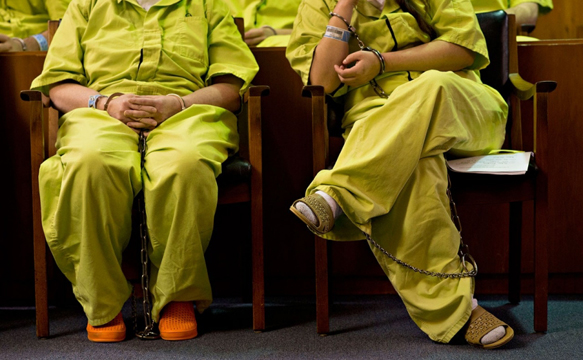By Michele Goodwin | Originally Published at Huffington Post. July 17, 2015 11:17 am EDT Updated: July 17, 2015 11:59 am EDT | Photographic Credit; Daniel Acker/Bloomberg. Getty Images
For example, even as President Obama brought greater attention to mass incarceration through the robust work of the Department of Justice under the leadership of Eric Holder, the White House emphasized mass incarceration as a significantly male issue and reporters simply agreed. Earlier this week, when President Barack Obama addressed a standing-room only audience at the annual meeting of the National Association for the Advancement of Colored People (NAACP) on the problems of mass incarceration, his talk was hailed by news organizations as historic and bold. Coverage of his speech spanned from the Wall Street Journal to papers in the UK, in the ink press to the online blogs. The New York Times claimed the speech “put meat on the bones” of the President’s race agenda in the wake of the brutal slayings of nine church goers in South Carolina. The Washington Post exclaimed in its headline, “Obama Tells NAACP That Justice Reform Is Long Overdue,” informing readers that “Obama will become the first sitting president to visit a federal prison.”
However, for all of President Obama’s laudable and groundbreaking commitments to attacking sex bias, it was telling that his speech only once acknowledged women, when he exclaimed the U.S. was being robbed of “women who could be workers and taxpayers.” According to the President, “the bottom line is that in too many places, black boys and black men, Latino boys and Latino men experience being treated differently under the law.” This bottom line is a telling problem.
According to the Institute on Women and Criminal Justice (IWCJ), one of the leading national policy centers quantitatively and qualitatively researching women in prison, the population of women in U.S. prisons grew by over 800% between 1977 and 2007–nearly twice the rate as men in that same timespan.
The myopia engulfing our nation’s fragmented understanding of mass incarceration and the rising toll on women and their children is chilling. What President Obama and the White House overlooked in his address to the NAACP is that the U.S. incarcerates more women than any other nation in the world. Male-centered accounts about mass incarceration fail to stitch a more vivid and illuminating tapestry about children forced into foster care due to their mother’s incarceration, or capture the dramatic increase in the number of women incarcerated for drug related offenses. In recent years, non-violent, low-level, drug addicted women have been subjected to penalties similar to black market drug traffickers with ties to cartels, large-scale organizations, and gangs.
Concerns regarding women in prison are particularly relevant given proven cases of abuse, including rape behind bars, as well as healthcare mismanagement, threats of solitary confinement as a means of retribution, involuntary sterilization, and even deaths. Women have given birth in prison toilets, on prison floors, and sometimes neither they nor their babies survive. Just this week, as President Obama gave a stirring address about the conditions men suffer through in prison, Sandra Bland, a 28 year old black woman, incarcerated on a traffic stop in Texas, somehow died two days later while in police custody. How does a woman–or anyone–die after a traffic stop involving the failure to signal before changing lanes? Local authorities claim she killed herself, but her family disagrees–pointing to a new job she was about to start at her alma mater.
Importantly, there is an urgent need to recognize that the dangerous norms that trigger male incarceration, particularly the drug war also impacts women. The U.S. incarcerates more women than India, Russia, and China combined. This issue will not resolve on its own. Nor will policy solutions designed primarily, if not exclusively for men, address the concerns of women behind bars, including caring for children–as incarcerated women are often the primary caretakers. It will take strong leadership to call attention to this lest women and the dire consequences they face behind bars remain invisible.
Michele Goodwin holds the Chancellor’s Chair at the University of California, Irvine with appointments at the School of Law, School of Public Health, and Department of Gender and Sexuality Studies. She directs the Center for Biotechnology and Global Health Policy. Professor Goodwin has published with Forbes, Salon.com, the L.A. Times, Chicago Sun Times, Houston Chronicle, Christian Science Monitor, and the NY Times among others.| Follow Michele Goodwin on Twitter: @michelebgoodwin
Michele frequently lectures world-wide on issues involving human rights, reproductive justice, bioethics, and health law. She served as a Visiting Professor at the University of Chicago and as a Visiting Scholar at the University of California-Berkeley and Columbia University Law School.
This piece was reprinted by EmpathyEducates with permission or license. We thank the Author, Michele Goodwin for her kindness, observations, research, and for giving voice to what we believe is a vital conversation. What about the women and women in prison?












Leave A Comment